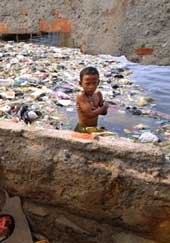|
|
| Dark foreboding |
The vulnerability to flood damage in megacities has recently become an increasing problem where rainfalls frequently exceed the capacity of the flood control facility and paralyse city functions.
Actions: A web based initiative is maintained to introduce the public to various water problems occurring in river basins and cities of the world and the methodologies used to solve the problems objectively from a researcher’s viewpoint. Key research groups are settled to introduce the current issues and actions on flood and water environment in some cities for coming discussions.
In order to initiate the forum’s statement “Water is Life”, over 100 messages, from ancient and recent texts and narrations, have been exchanged to discuss and emphasize the power of water on human values for water and sanitation. The ancient best practices of water saving and water treatment have been highlighted as a part of other statements and worldwide projects to give scientific basis for sustainable water availability.
Preparation of flood control facilities has been in progress in order to protect populations and property from flood damages. In the case of Osaka, Japan, comprehensive flood control facilities have been constructed in addition to tidal waves control facilities.
Recommendations: Promote advanced pollutant runoff models, including endocrine disrupters and toxic equivalents to predict water quality in the downstream areas. Establish procedures to make a plan with landuse regulation for urban flood management incorporating flood and debris flow simulations. Promote conservation of bio-diversity of fauna and flora in river courses.
Human values have profound influence on people. Therefore, integrating these values in schools and education programmes could better achieve water and sanitation sustainability. Support the people’s movements to revive the ancient practices of water harvesting, water saving, water segregating, water disinfections and in-house wastewater recycling and treating .
Promote urban area type flood control measures where hardware measures are associated to soft measures such as hazard map and flood forecast.
Key issues: Capitals with large population in many developing countries are suffering from poor hygiene condition and severe water pollution. Even in developed countries, the discharge of inadequately treated sewage, especially in large cities, threatens human and ecosystem health. Deplorable water, health and environmental conditions in urban and peri-urban slums is assuming larger dimensions due to inadequate town planning, deficiency of political framework, and absence of participatory management.
Sustainable programmes for water, sanitation and hygiene are problematic due to major obstacles of coordination and cooperation between potential parties. Additional stress is imposed by the lack of enabling legal and institutional framework, the need to capacitated institutions and the need to clear demand for water and sanitation services.
Viable actions for sustainable water supply require the enhancement of project delivery and procurement. The latest is conditioned by appropriate capacity building, suitable institutional reforms, and clear legal and regulatory framework.
There are a number of barriers to the transfer, adoption and use of environmentally sound technologies in the water sector. Actions are urgently required to address these barriers, particularly within developing countries. To encourage sustainable water use, developing countries need to be assisted in both identifying these barriers and in implementing appropriate policies and action plans to overcome them.
Actions: Large cities in Japan and some developing countries had overcome severe waterborne diseases and deterioration of water environment by developing appropriate regulatory frameworks, effective mobilization of economic instruments, broad stakeholders’ participation, watershed management approach, and continuous implementation of appropriate sewage works with innovative technologies. The United States of America-Japan partnership for clean water, research and development of low-cost sewerage and sanitation will play an important role in the improvement of wastewater management in developing countries.
Endorse technical activities to help urban and peri-urban slum dwellers to locate safe drinking water points, and suitable places for community and private latrines with septic tanks. Dialogue between slum dwellers and technical staff has been established using NGOs as facilitators.











